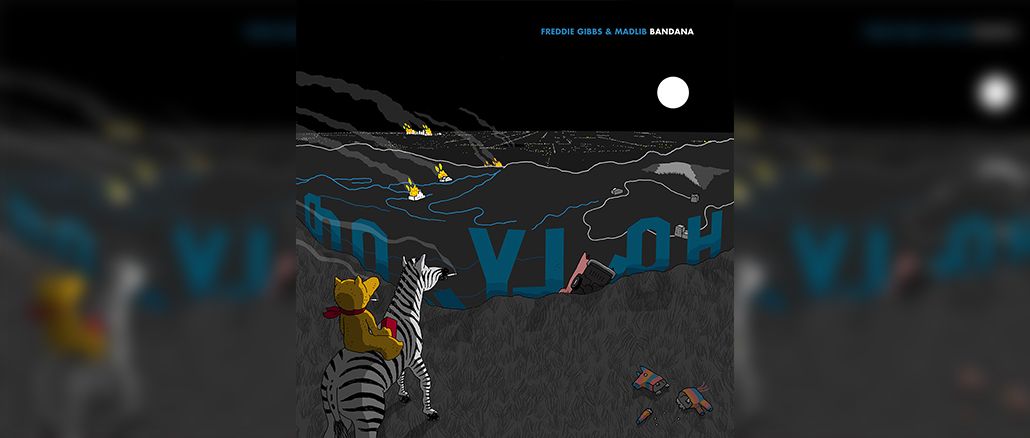On ‘Bandana,’ Freddie Gibbs and Madlib do what they do best
by Daniel Paskowski
2019-07-12

Freddie Gibbs & Madlib
Bandana
RCA Records · June 26, 2019

Freddie Gibbs and Madlib caught lightning in a bottle with their 2014 collaborative debut Piñata, lauded by critics and listeners alike for its rugged authenticity and punchy execution. In the years since, fans have been eager for a second helping from the Gary, Indiana emcee and Oxnard, California rapper-producer who operate together under the alias MadGibbs. Fortunately, Bandana is a worthy sequel that builds on Piñata’s strengths to deliver a project that is on the same level as, if not superior to, its predecessor.
Bandana, strangely enough, is an album that almost never got made. Madlib, who purportedly produced all of the instrumentals on an iPad, originally gave the bulk of the beats that would appear on the album to Kanye West for his The Life of Pablo sessions in 2016. That same year, Freddie Gibbs was arrested in France and later extradited to Austria, alleged to have committed rape and sexual assault. Soon acquitted of all charges, Gibbs wrote the majority of the album while held in a jail cell where he was offered few amenities and had to recall the beats Madlib gave him from memory.
The effect of this harrowing experience on Gibbs is manifested on many of Bandana’s tracks. He is angry and determined on the venomous pair “Half Manne Half Cocaine” and “Flat Tummy Tea,” making sure his words are heard at all costs. Meanwhile, “Fake Names” and “Situations” are just two of many tracks on this album where Freddie ruminates, in a manner that could almost be confused for remorse, on the cutthroat nature of his illicit business dealings. Like many maturing emcees, he has become a father in recent years, and explores his complex familial relationships on songs like “Practice” and through these lethal juxtaposed bars on “Giannis:” “Every mornin’ I wake up with my daughter, Dora Explorer/Then I get right back to the pot/Kitchen stankin’, that’s potty trainin’.”
Indeed, Gibbs seldom falters lyrically on this album, experimenting with fast and ferocious flows and choosing to share the stage with a select five guest artists, a paltry few in comparison to Piñata. “Palmolive,” featuring Killer Mike and Pusha T, is a face-melting masterclass in gritty coke rap from the three emcees. Listeners may recall the sample for “Education” also being used on “Bonjour” from Nas’s 2018 full-length NASIR, but Kanye and co.’s lighthearted interpretation of the source contrasts heavily with Madlib’s menacing flip on which Yasiin Bey, formerly known as Mos Def, and Black Thought of Blackstar fame omit choruses and assist Gibbs in a scathing commentary on societal injustice.
Of course, Bandana would only be a half-complete project without Madlib’s legendary production, drawing samples from Bollywood and soul music alike to assemble an impressive foundation for the record. Beat switches are plentiful and illustrate not only Madlib’s skill as a producer for blending disparate sounds, but Freddie’s ability to turn his flow on a dime. This is perhaps best exemplified on “Fake Names” where laid-back bars over a brooding saxophone make way for curt triplets atop a flute, right in the middle of his verse. The fact that the album was produced on an iPad is no weakness here, as Madlib’s intricate soundscape slowly reveals itself to the listener upon multiple listens, especially through a decent pair of headphones. The album-encompassing warm, low fidelity mix is reminiscent of Madlib’s earlier work on his 2006 Beat Konducta anthologies and handily adds to the grimy aesthetic without detracting from the sound quality. The most glaring misstep is perhaps the selection of bookending skits, since hearing the Cussing Pastor’s morning sermon can become grating after the tenth listen due to his gratuitous cursing and rather vacuous message. Other skits, like the charming but questionably appropriate text-to-speech robotic narrator with a thick Japanese accent at the end of “Fake Names,” add a certain calm before the storm seen in songs like the blistering “Flat Tummy Tea.”
Gibbs poses the following question before the beat kicks in on standout track “Palmolive:” “It should speak for itself, you know what I mean?” By employing a no-frills approach and delivering razor sharp lyricism atop best-in-class production, MadGibbs’ work here certainly does speak for itself. With Bandana, the pair have shown that lightning can indeed strike in the same place twice, and once again offer a compelling candidate for album of the year.
